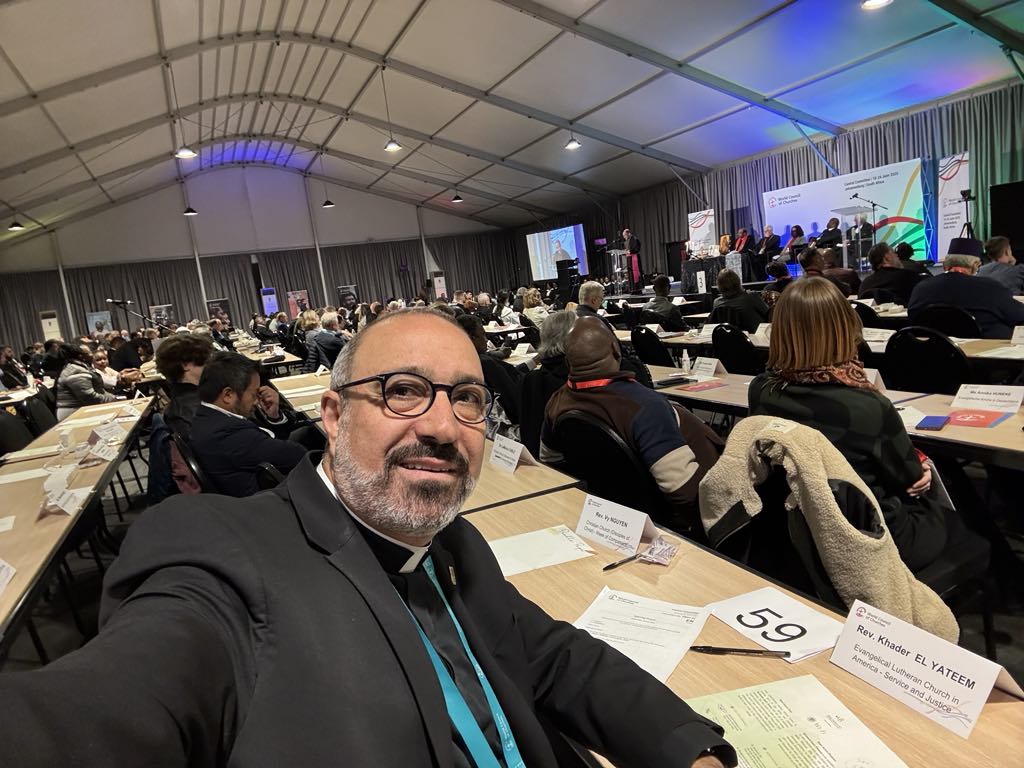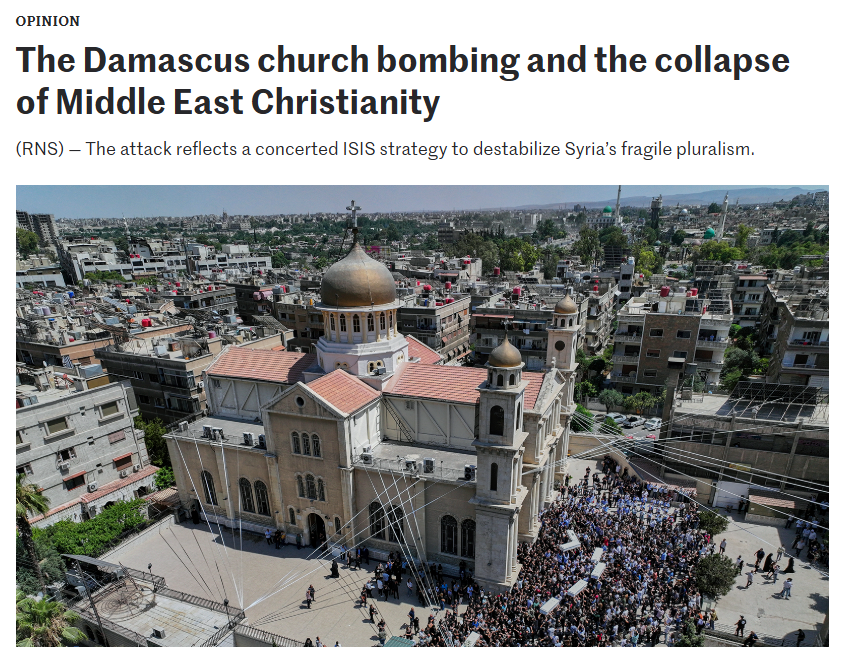
Previous US border police detain Rev. El-Yateem on his return from WCC Johannesburg meeting which called Israeli actions “apartheid”

Daoud Kuttab
June 24, 2025
(RNS)
The suicide bombing at St. Elias Greek Orthodox Church in Damascus that killed more than 20 worshippers on Sunday (June 22) and injured dozens more is a tragic reminder of the vulnerability of Syria’s religious communities amid a fragile security situation. The attacker entered the church during Sunday Mass, opened fire and then detonated a bomb strapped to his body. Syrian authorities have linked him to a sleeper cell of the Islamic State group, known as ISIS.
In the aftermath, according to Syrian TV, security forces raided suspected ISIS hideouts, killing two militants — including the suspected facilitator — and arresting six others, among them the cell leader. The interim government, led by President Ahmed al-Sharaa, now faces a pivotal test of its ability to protect Syria’s diverse communities while rebuilding broken institutions in a deeply fractured nation.
This attack should not be seen in isolation. It reflects a broader strategy by ISIS and its remnants to reignite sectarian tensions and destabilize Syria’s fragile pluralism. Christians, Alawites, Druze, and other groups have long been targeted by such extremists. A response limited to reactive raids will not suffice. What Syria needs now is a comprehensive national strategy grounded in justice, equal citizenship, and the rule of law.
Religious and political leaders from Jordan, Palestine, Lebanon, and Syria itself have responded with a powerful, unified voice. Jerusalem’s Orthodox Patriarch Theophilos III described the bombing as “a bleeding wound to the dignity of all humanity.” The Middle East Council of Churches and the Greek Orthodox Patriarchate of Antioch called on Syrian authorities to ensure the safety of religious minorities and uphold their right to worship in peace.

Jordan’s Ministry of Foreign Affairs strongly condemned the attack, affirming its full solidarity with Syria. Ambassador Sufian Qudah reaffirmed Jordan’s rejection of all acts of terror that threaten regional stability. The Islamic-Christian Commission for the Support of Jerusalem and Holy Sites called the bombing part of hostile agendas aimed at dismantling Islamic-Christian unity, deeply rooted in Syria’s history.
Maronite Patriarch Cardinal Bechara Boutros Al-Rahi denounced violence against houses of worship and called for internal and international efforts to promote peace, dialogue, and mutual respect. He warned that attacks like this risk erasing centuries of regional pluralism and cultural heritage.
These concerns reflect a deeper concern about the ongoing exodus of Christians from the Middle East. Decades of war, occupation, and sectarianism have devastated historic Christian communities. From Lebanon’s civil war and the U.S. invasion of Iraq to the prolonged occupation of Palestine, the Christian population in the cradle of Christianity is nearing collapse. Despite the efforts of religious and civic leaders to stem the tide, migration — driven by insecurity and opportunity abroad — continues to rise. Arab Christian communities in North America, Europe, and Australia are growing rapidly.
Yet there are hopeful models. In Jordan and Palestine, Christian representation in parliament and in local government bodies exceeds demographic proportions. Christian Arabs are advancing in business, education, and professional fields. In the West Bank, Christian-affiliated organizations are the third-largest employers, contributing meaningfully to health care, education, and the economy.
Universities such as the American University of Beirut, Birzeit, and Bethlehem, founded by Christian churches and families, stand as enduring symbols of Christian investment in knowledge and nation-building. Christian entrepreneurs continue to shape Arab economies through leadership in banking, commerce, and industry.
The bombing of St. Elias Church is not merely a sectarian act. It is a test of our shared humanity, our regional resilience, and our moral resolve. It must not sow fear or division but instead inspire renewed commitment to unity and coexistence.
Governments and civil society must move beyond symbolic gestures. Real security, equitable justice, and sincere interfaith solidarity are essential. ISIS feeds on division; our duty is to deny ISIS that weapon. Every place of worship — and every life within must be protected.
As the Jordan Evangelical Council stated: “Targeting Christians — or any faith group— undermines the very fabric of our societies and the core message of peace that religions, especially Christianity, strive to uphold.”
This tragedy must not end in mourning alone. Let it be a call to action.
(Daoud Kuttab is a former Ferris Professor of Journalism at Princeton University and publisher of Milhilard.org, dedicated to the Christian community in Jordan and Palestine.


تكافح مجلة “ملح الأرض” من أجل الاستمرار في نشر تقارير تعرض أحوال المسيحيين العرب في الأردن وفلسطين ومناطق الجليل، ونحرص على تقديم مواضيع تزوّد قراءنا بمعلومات مفيدة لهم ، بالاعتماد على مصادر موثوقة، كما تركّز معظم اهتمامها على البحث عن التحديات التي تواجه المكون المسيحي في بلادنا، لنبقى كما نحن دائماً صوت مسيحي وطني حر يحترم رجال الدين وكنائسنا ولكن يرفض احتكار الحقيقة ويبحث عنها تماشيًا مع قول السيد المسيح و تعرفون الحق والحق يحرركم
من مبادئنا حرية التعبير للعلمانيين بصورة تكميلية لرأي الإكليروس الذي نحترمه. كما نؤيد بدون خجل الدعوة الكتابية للمساواة في أمور هامة مثل الإرث للمسيحيين وأهمية التوعية وتقديم النصح للمقبلين على الزواج وندعم العمل الاجتماعي ونشطاء المجتمع المدني المسيحيين و نحاول أن نسلط الضوء على قصص النجاح غير ناسيين من هم بحاجة للمساعدة الإنسانية والصحية والنفسية وغيرها.
والسبيل الوحيد للخروج من هذا الوضع هو بالتواصل والنقاش الحر، حول هويّاتنا وحول التغييرات التي نريدها في مجتمعاتنا، من أجل أن نفهم بشكل أفضل القوى التي تؤثّر في مجتمعاتنا،.
تستمر ملح الأرض في تشكيل مساحة افتراضية تُطرح فيها الأفكار بحرّية لتشكل ملاذاً مؤقتاً لنا بينما تبقى المساحات الحقيقية في ساحاتنا وشوارعنا بعيدة المنال.
كل مساهماتكم تُدفع لكتّابنا، وهم شباب وشابات يتحدّون المخاطر ليرووا قصصنا.